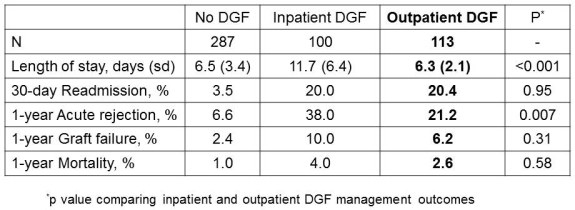Outpatient Management of Delayed Graft Function (DGF) Is Associated With Reduced Length of Stay and Acute Rejection
1Department of Medicine, University of Wisconsin, Madison, WI
2Department of Surgery, University of Wisconsin, Madison, WI.
Meeting: 2015 American Transplant Congress
Abstract number: 205
Keywords: Graft function, Graft survival, Kidney transplantation, Length of stay
Session Information
Session Name: Concurrent Session: Kidney: Hospitalization/Readmission
Session Type: Concurrent Session
Date: Monday, May 4, 2015
Session Time: 2:15pm-3:45pm
 Presentation Time: 3:27pm-3:39pm
Presentation Time: 3:27pm-3:39pm
Location: Room 118-AB
Delayed graft function (DGF) increases hospital length of stay (LOS) and risk for readmission, rejection, early graft loss and death. We created a multidisciplinary DGF clinic in July 2011 for outpatient management of DGF patients. We hypothesized that early discharge and management of patients with DGF to a specialized "DGF clinic" is associated with reduced LOS without compromising readmission, acute rejection, graft loss and patient death in the first post transplant year.
Methods
We reviewed data from 500 patients who received a deceased donor kidney transplant between 2009 and 2014, including 213 with DGF and 287 without DGF. We compared the outcomes of patients without DGF, those with DGF who were managed in the outpatient DGF clinic and those with DGF who were managed as inpatient prior to the creation of the DGF clinic. A total of 113 (53.1%) of the 213 patients with DGF were seen in the outpatient DGF clinic. Patients were followed for 30-day readmission, acute rejection, graft loss and death by 1 year.
Results
For patients not seen in the outpatient DGF clinic, DGF was strongly associated with greater LOS, 30-day readmission, and 1-year acute rejection and graft failure compared to patients with no DGF. (Table 1; all p values < 0.001).  Patients with DGF seen in the outpatient clinic had significantly lower LOS and 1-year acute rejection rates, with similar 30-day readmission and 1-year graft loss and mortality compared to their counterparts with DGF managed in the inpatient setting. The use of thymoglobulin induction did not differ significantly between patients with DGF seen in the inpatient (43.0%) versus outpatient (35.4%) setting.
Patients with DGF seen in the outpatient clinic had significantly lower LOS and 1-year acute rejection rates, with similar 30-day readmission and 1-year graft loss and mortality compared to their counterparts with DGF managed in the inpatient setting. The use of thymoglobulin induction did not differ significantly between patients with DGF seen in the inpatient (43.0%) versus outpatient (35.4%) setting.
Conclusion
Close outpatient management of patients with DGF in a specialized clinic is associated with substantially shorter hospitalization and lower incidence of acute rejection, without significant differences in 30-day readmission or 1-year graft survival. This has important implications for quality outcomes and cost control.
To cite this abstract in AMA style:
Muth B, Astor B, Turk J, Mohamed M, Parajuli S, Kaufman D, Mandelbrot D, Djamali A. Outpatient Management of Delayed Graft Function (DGF) Is Associated With Reduced Length of Stay and Acute Rejection [abstract]. Am J Transplant. 2015; 15 (suppl 3). https://atcmeetingabstracts.com/abstract/outpatient-management-of-delayed-graft-function-dgf-is-associated-with-reduced-length-of-stay-and-acute-rejection/. Accessed February 24, 2026.« Back to 2015 American Transplant Congress
